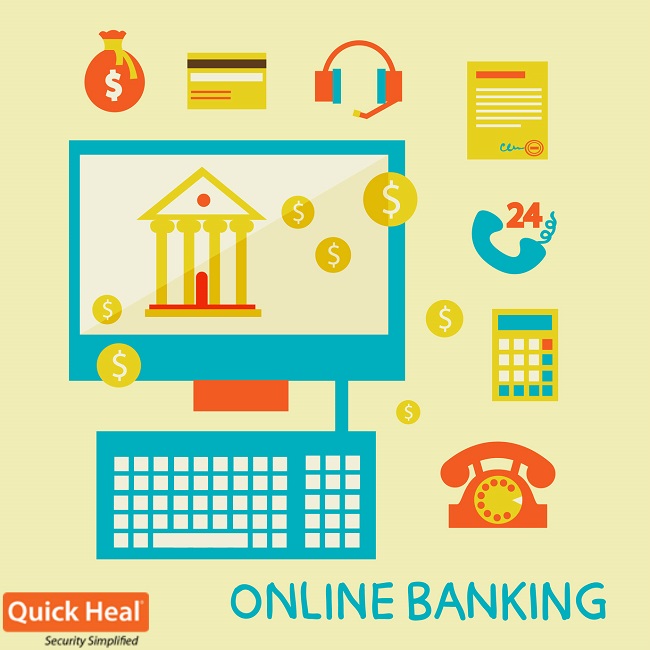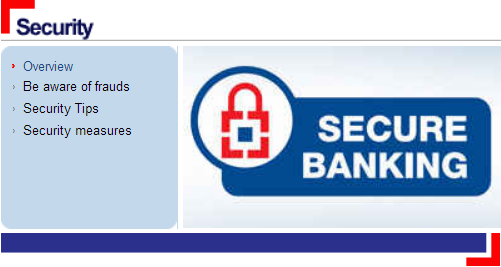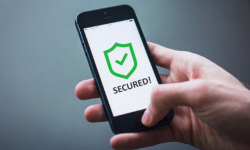9 Netbanking Security Tips – Why you need not fear Netbanking
Internet banking, or Netbanking, is fast, convenient and easy to use. Through this service one can now transfer money, pay bills, create a fixed deposit and do much more. There is no need to physically visit a bank and wait in a queue now as everything can be done with a few simple clicks. What’s more, all major private and public banks offer this feature so anyone who owns a bank account can make use of this service.
However, many people are still hesitant to use this service. Security risks exist for sure, but with adequate safety measures they can be avoided. Fraudulent attempts are often made so as to attack Internet bankers and to trick them, but with the right precautions and safety awareness all fraudulent attacks can be avoided. Keep the below mentioned Netbanking security tips in mind for online banking transactions.
Safety Tips for Netbanking Users:
1. Change your password frequently
While it is highly important to choose a password that is very strong and has a good mix of letters, numbers and other characters, it is even more important to change your Netbanking password frequently. Also, do not use the same password as your email accounts or other Netbanking online accounts.
2. Avoid public computers and networks
When you urgently need to access your Internet banking account, refrain from using public computers in a cyber café or accessing a public Wi-Fi network. These services are fine for general browsing, but they are not an option for accessing your bank account as several other people can gain access.
3. Preserve your personal confidentiality
Never share your login ID and password with anyone who claims to be from your bank or any other service provider. Even if the person is trusted and reliable, do not share your account details. It is as good as giving that person uncontrolled and unregulated access into your personal bank account and your hard-earned money.
4. Lookout for attempted phishing attacks
Be aware and forewarned about phishing attempts on your email, mobile phone, social networks or through phone calls as well. If someone out of the ordinary is asking for too many details, do not share anything with them. Be cautious at all times as you never know when you may be under attack.
5. Do not click on login links in emails
If you get an email from your Netbanking provider, do not click on links within the email in order to sign in. The email and the links could be fake. Instead, type in the address of the service in the address bar and login on your own to avail offers or to undertake other activities. Ideally, save the login URL of the service as a bookmark on your browser.
6. Audit and check your account frequently
If you have not accessed your account in a while, do so from time to time. Once every 2-3 days should be good enough. Once logged in, check if your account balance and summary is in line with your known expenses and income. If you notice anything suspicious, contact your bank immediately.
7. View the last logged in details
Once you have logged in to carry out a check of your account, check the last logged in details. Almost every bank provides this feature and it allows you to see the date, time and location of the last time someone logged in to your account. If you find that the last login was not yours, raise an alarm immediately.
8. Always log out
Whenever you log in and access your bank account, always make it a point to log out. Never close the tab or the window without logging out. This is a common safety precaution that many users tend to overlook most of the times.
9. Make use of effective and updated antivirus
Needless to say, the best form of defense against phishing attacks, malware, fraudulent pages, and many more security threats is an effective and updated antivirus on your machine. When your personal bank account and more is at stake, do not leave your security to part-time and ineffective antivirus solutions. Use a trusted product with advanced features. Quick Heal Internet Security makes your Netbanking activities easier and safer.
With these security measures in mind, Netbanking should not cause any more concerns to you. After all, the service exists to make your life easier so there is no point avoiding it. It is essential to adapt but with adequate safety measures in mind.





66 Comments
good article please advise in case one has to do net banking on a public wifi or public computer
Hi Manish,
In such unavoidable scenarios, always log out from your netbanking account. And delete the browser cache and cookies when done. And also ensure that you did not click on ‘Save Password’ when you logged in, this is a message most browsers display by default.
Thanks.
Thx for net banking security.
its very important now-a-days to banking with a secure bank and with that life is becoming very busy and very energetic so everyone of us don’t want even to go to the bank and make a line there where you can find rush,so no one want to sop in to that line.its too tough there
Dear sir,
I am using quick heal security.
how can i pay?(1000Rs.Only)date25june2014.
Thanking you.
Hi Nilesh,
Can you please elaborate further on your question? If needed, you can contact our support center on 0-927-22-33-000 for real-time assistance.
Thanks.
Good,keep it up..
generally at old age people forget, if one has to do similar functions in different fields.is their any gadget,very small enough to accomodate in pocket which wiii generate strong passward,displayed on screen if connected by USB to
your laptop? this will help us to remember the strong password & every time or frequently the password can be changed.pl.let me know
Hi Mr. Vishnu,
If such a device exists, you would need to search for it on popular platforms like Amazon or Flipkart. There are several online password generators though that you can use as well. These can be located via a Google search.
Thanks.
I am not using original windows 7 but have a subscribed Quick heal total security in it .
So can i access internet banking on my PC , is it safe or not…
please tell..
Hi Mayank,
Yes, you should be able to access Internet banking via your PC.
Thanks.
While using net banking is it always advisable to use the virtual keyboard provided on the web site (even when working from your usual computer at home having Quick Heal Anti Virus Software) or is it recommended only while accessing Net Banking from a not regularly used computer.
Also, please briefly explain as to how does ‘Key Stroke’ capturing take place, and is using the Virtual Keyboard the only way not to fall prey to ‘Key Stroke’ capturing
Thanks
Hi Amod,
Yes, it is advisable to use the Virtual Keyboard even while operating your account from your home computer. It is better to be safe than sorry. Keystroke capturing, or Keylogging, is a method through which software records the keys that are pressed on the keyboard. A web search will help you with detailed information about this process.
Best regards.
Rahul
Thanks A Lot.
Amod
In reference to Manish Kotak query for safety using net banking on a public wifi or public computer any one can use incognito/private window of the browser( it is now available on most browsers)where no data is stored.
Hi G.A.,
As pointed out by Manish, sometimes it is necessary to log-in from public computers. We don’t know whether the internet cafe is having cabled net connection or secured wi-fi connection. Fortunately now-a-days one can log-in from smart phones. The only trouble with the touch phones is, typing is cumbersome & leads to too many typographical errors! One has to be very careful!
One can use private browsing window as it does not save cookies, cache and password even if you clicked on save password or keep me logged in
Very use full. This would be inspired people to adopt netbanking, the hassle free banking facility.
Thank You, It is a very informative article. Net banking is very convenient and saves lot of time. One doubt many users has is , in case of power failure or net dis-connectivity what one is supposed to do? what happens to the transaction? Whom to approach? Pl clarify.
Hi Penna,
It really depends on what stage of a transaction you may be. If a transaction is in the process of being completed, loss of power of net connectivity will disrupt the transaction and it will remain incomplete. A wrong transaction will not occur due to loss of power or net. If you have any more questions, do let us know.
Thanks.
thanks for familier with this thing..
Is it safe to access any netbanking site by clicking on saved home pages or bookmarks?
Hi Mahesh,
Yes, this is perfectly safe.
Thanks.
Nice article… thanks for updating.
Very use ful.Thanks for net banking security.
One more thing I would suggest to all my friends is to use virtual key board for typing the user name and password though it is a bit inconvenient but it is safe as the virtual key board changes every time so that hacking the password is very difficult for the hackers. It is one of the suggestions from the bank people only.
agreed
NICE,VERY USEFUL togedhor “WE CAN”
Is it still necessary to use the virtual keyboard, if I’m using my personal laptop for accessing bank accounts ?
Hi Shailesh,
The virtual keyboard is not a safety precaution that is meant only for public computers. As an added security measure, you can definitely use it on your personal laptop as well.
Thanks.
THANK YOU QUICK HEAL
This is very very good suggestion. Thank you very much
I always read these tips from Quick Heal (and Rahul) and learn from it, in fact I use quick heal on most of my computers and that’s why Rahul I’m taking time to write this (because today Quick Heal is on a level which is read Internationally and if there are errors it’ll show a bad remark on the company’s integrity).
These are great tips, I thank you for sharing them but there are a few errors in the English that is used. Misused words: “Alphabet” and “Mail”
Alphabet is one but the letters are 24, so if you say Alphabets then it’s wrong English. A, B, C, or D, are all letters not “Alphabets”.
Secondly
Mail is not eMail, Mail means a physical mail like Post, that’s they we have post offices in India for Mails/Posts and that’s why they say “Mailman”/”Postman” but eMail is not Mail, eMail is electronic mail.
I hope this comment is taken in a positive way.
Please feel free to cross check using google search for “Alphabet” and “Mail” as well as “eMail”
These misconception are only in India.
Thanks
Hi,
Thank you for your feedback and your comment. Your point about the misuse of alphabet is spot on and that correction has been made. However, as per your feedback, we cannot locate the spot where we referred to ’email’ as ‘mail’.
Thanks.
Its a nice and helpful article… Thanks for the tips sir.
thank you!i have always avoided internet banking but it does nt need to b so complicated.
i wanted to ask something else, i am using utorrent is it safe or should i stop using it.
Hi Swaleha,
Yes, using uTorrent is safe. But safety can be compromised depending on the torrent that you are actually downloading. If it contains malicious software, that can be dangerous for your machine.
Thanks.
Thank you Rahulji for publishing nice article. It is very useful for freshers. I feel every body should save this on their system and go through frequently.
Regards
Hello,
As you said keep changing password periodically, what what if i don’t change password, but use my home internet only for banking.
I have quick heal at home
Hi Saiprasad,
While you are generally using your home Internet for banking purposes, your information should be relatively safe. It is advisable to change passwords frequently. However, if you do not, Netbanking accounts usually require a mandatory password change once every few months. So in such a scenario you will need to change the password anyway.
Best regards.
Also look at the top left corner for the address bar. It must show https in stead of http which means it is secured.Further look for the symbol of a lock in the address bar for secured surfing.
100% AGREE WITH THE COMMENT. > MOST IMPORTANT ONE !
your response
Yes, using uTorrent is safe. But safety can be compromised depending on the torrent that you are actually downloading. If it contains malicious software, that can be dangerous for your machine.
I would like to know that how to identify malicious software, as there are so many software available online freely including operating software.Name few of them used for home users strictly avoided.
Hi Kishor,
There are many torrent sites on the web and most of them are unsafe, to a certain extent. We cannot possibly give you an entire list here. We suggest you regularly follow our blog and social media for updates. As and when we discover security threats, they are shared over these platforms. Regarding software, the source is always a good indicator of its safety.
Best regards.
What is safer and better ….. net-banking or online payments using debit card/credit card?
Hi Mr. Bedi,
We would suggest that Netbanking is the safer option of the two. However, the best solution is to have a separate bank account for carrying out online transactions. Do not keep too much money in this account so that even if there is some issue regarding loss or theft, the actual loss is not that large. Do not use the account where you have all your savings, for online transactions. This is the best precaution to take.
Best regards.
ITS LIKE A FREIND ALWAYS WITH ME…….THANK U FOR THIS SERVICE
Both are safe but net banking is safer than online payment through cards.
Thanks for the good advice.Request to follow the guide line as advised for personal security.
Hi Rahul,
I recently bought new Laptop i3 500gb 4 gb RAM made ASUS. Earlier it was equipped with Mac Afee antivirus which is expired now m using Kasperskey trial version.
Please suggest what to do now should I take Quick heal for my Laptop…and how much it’ll cost
Hi Pankaj,
Thank you for inquiring about our product. Please visit this link to see the full list of products we provide for home users – https://www.quickheal.co.in/home-users. You can choose any of these products and download and install them from here itself. Please let us know if you require any assistance for that.
Best regards.
and now a days avoid IE and use other browsers like chrome or mozila … netbanking is safe if u unable otp (one time password for every transaction)
Hi !
Article on Net banking was very informative. Thanks !
Is it safe to use password manager , since it is becoming day by day difficult to remember various passwords. Or it is advisable to make an excel sheet for all passwords and protect it by a single password.
Hi Rajendra,
Thank you for your feedback. Both the methods you have suggested above are safe and can be used. If you use a password manager then you can access your passwords on the go and from anywhere, so that seems to be the more beneficial solution.
Best regards.
HI RAHUL THANKS FOR THE TIPS REAGRDING NETBANKING
Hi Rahul,
While purchasing products online, at the time of billing we are directed to a page where symbols like ‘Verisign’ (with a tick mark sign), ‘Norton’ etc are displayed to convey that the site is secure. My question is, cannot these logos etc also be replicated and displayed by a fraudulent site?
So how can one be really sure that the site is genuine and that our Cr/Dr card details that we enter are safe?
Regards
Amod
Well, I am user of Quick heal total security for windows. It works fine. But it is unable to block access to fraudulent websites like shophunk etc.which offer exciting offers as popup-like “win samsunxg galaxy S5 in Rs.699 or your money will be returned back”, but they never told that cash return os not possible. People are almost not aware with inbuilt security features like challenged questions on netbanking sites. You, leader in antivirus industry, must take care of these and train your customers effectively. You should add features like web security as available in your tablet security.
its really helpful advise,,, i have an question that some times we use our own computer regularly and we use netbanking site in a tab and also use many social sites, mail accounts, etc. in the same time in different tabs, many time we forget to logout and after some time when we click the netbanking site again to work but it shows that login season expired, so my question is — in this regard any phishing attacks, malware, fraudulent pages, and many more security threats is an effective my computer as well as is there any major problem to be face.
Hi Bidyut,
The “Session Expiry” is in fact a security measure that banking websites implement. You need not worry if your net banking’s session expires.
Regards,
Dear Sir,
please give me a property feedback of the following-
its really helpful advise,,, i have an question that some times we use our own computer regularly and we use netbanking site in a tab and also use many social sites, mail accounts, etc. in the same time in different tabs, many time we forget to logout and after some time when we click the netbanking site again to work but it shows that login season expired, so my question is — in this regard any phishing attacks, malware, fraudulent pages, and many more security threats is an effective my computer as well as is there any major problem to be face.
in my home , there are 2 computers…. using same network via wifi….. if i use netbanking in 1 computer alone will hackers able to access anything via the network which is used simultaneously in another computer at the time of transactions… ?
Hi Arul,
Ensure that your WiFi connection that you are sharing between the two computers is secured with a WPA2. Also ensure that both the computers are running an up-to-date antivirus software. Having these two security methods in place, your PC can be safe from hackers who use unsecured WiFi to attack their victims.
Regards,
i want to do net banking .i have a laptop.but i am worried about the security.pls send me suggestion.thank you.
Hi Tapas,
Netbanking is relatively secure for your online transactions. Some suggestions are keep a strong password, do not log in to your account from unknown machines or through unknown Wi-Fi networks, keep your computer protected with antivirus and regularly update your programs and applications, avoid clicking through unknown emails and suspicious links, always log out when you are finished and set up account notifications for every transaction.
These security tips will help you out immensely while carrying out transactions online.
Regards.
I just want to say that I like your posting. In fact I am using your site regularly. Your articles are very effective and i am very thankful to you for sharing this site with knowledgeable content .
Thanks mate this post was really helpful. Regards